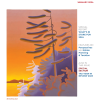For most financial advisors, April is already synonymous with Tax Day, the April 15 filing deadline. However, April is also significant in the estate planning realm as National Financial Literacy Month. Over half of the adult population, 120 million Americans, doesn’t have an up-to-date estate plan to protect themselves and their families. In fact, most individuals who reach the age of 70 are on the verge of running out of money, long before their life expectancy.
The Financial Awareness Foundation is a nonprofit organization committed to solving the major social problem of the lack of financial awareness and financial literacy. The Foundation serves as a nonpolitical “financial awareness advocate” to the general public, delivering and developing exceptional educational content for the public and to professionals, nonprofits and educational institutions that support the public’s estate, financial and charitable planning needs. It also recognizes, promotes and unites the leading financial service and nonprofit associations/organizations that are helping improve financial awareness and financial literacy with other associations, organizations, nonprofits, educational institutions, companies, firms and individual efforts.
Need for Increased Awareness
Managing personal finances today is more complicated and more important than ever. Americans are living longer, but saving proportionately less—their money is being drained by the high cost of housing, taxes, education and health care, while dealing with the uncertainty of investments and the current economy. They worry about the future, or in some cases, try to not think about it at all.
One of the alarming trends determined by a report released by the Consumer Financial Protection Bureau is that individuals are making critical financial decisions based on information gained from non-expert sources, making it all the more likely that financial assets aren’t being properly managed or transferred.
Individuals, whether in the position to make transfers of wealth or not, need access to better personal financial management tools and information, to make better informed everyday financial decisions—and to communicate and work more effectively with their financial advisors, if any. Universities and colleges are in an ideal position to provide access to such tools and resources necessary to better address financial challenges and achieve and maintain personal and family financial and philanthropic goals, while reducing debt and the stress that surrounds this aspect of life (particularly because student debt is one of the biggest financial burdens on young adults and their families).
Wealth Transfers
According to a report by John J. Havens and Paul G. Schervish from the Center on Wealth and Philanthropy, Boston College, we’ve entered into the greatest wealth transfer in history. An estimated $59 trillion—divided among heirs, charities, estate taxes and estate closing costs—will be transferred from 116 million American households from 2007 to 2061. This means that without some financial and estate planning, a significant amount of these assets will be wasted; much of the remaining assets may not go to the right person(s) or organization(s) and may not be used as intended. Promoting awareness among clients can help produce needed gifts and bequests for nonprofits.
What Financial Advisors Can Do
Financial advisors are in a position to help promote awareness beyond their clientele, for example, by holding webinars or workshops tailored to alert, educate, motivate and assist the general public to cost-effectively establish and keep their estate, financial and gifting plans current.






